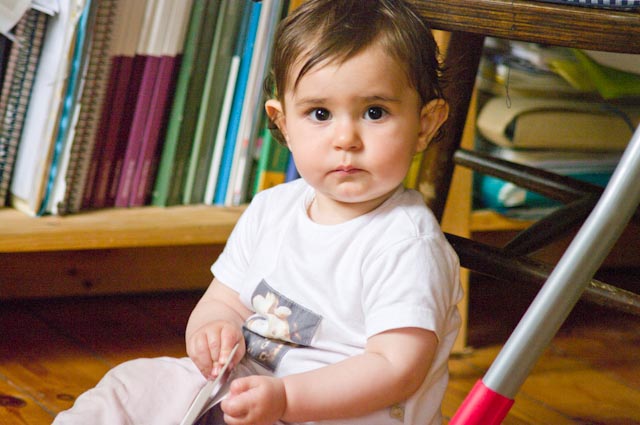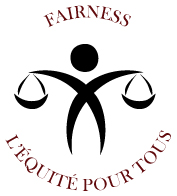CONTENTS:
e) Faces of the CCR: Andrew Saa Gbongbor, Fredericton
- Contact your MP about Bill C-49
- Changes from Bill C-11 explained
-----

a) No to C-49 – the anti-smuggling bill that punishes refugees
The Canadian Council for Refugees has expressed its grave concern that many of the measures in Bill C-49 fail to honour our obligations towards refugees and would result in refugees being treated unfairly. Despite the government’s claims that it is targeting smugglers, the people who will suffer if this bill is passed are the people fleeing persecution, including children.
Among the measures that appear particularly unfair are the following:
- Expanded powers to detain some refugee claimants for long periods. The CCR notes that children are among those affected by already existing powers of detention. Refugee children should not be detained.
- Keeping some recognized refugees in long-term limbo, by denying them the right for five years to apply for permanent residence, and therefore for reunification with their children, in violation of the Convention on the Rights of the Child. Children left behind overseas are at risk while waiting to be reunited with their parents who are refugees in Canada.
- Denial of freedom of movement for some refugees, in violation of the Refugee Convention. This provision would prevent, for example, a person from visiting family members who have taken refuge in third countries.
- Denial of family reunification rights for some refugees. This provision would prevent, for example, a person from being able to sponsor a spouse they married after arrival in Canada.
An outline of the CCR’s main concerns with Bill C-49 is available at http://ccrweb.ca/en/c49-key-concerns.
For a list of organizations calling for the defeat of Bill C-49, see: http://ccrweb.ca/en/organizations-calling-defeat-bill-c-49
Join the CCR’s call to elected official to vote against Bill C-49 at second reading. Contact your Member of Parliament (MP) by telephone or email as soon as possible. For suggestions of what to say, see: http://ccrweb.ca/en/c-49-contact-your-mp
Please pass on this call to action to others!
For additional information on Bill C-49 and how it would impact refugees, see the web page on the bill: http://ccrweb.ca/en/c49
b) Canada’s stateless children
 Snug in the womb of her mother in April 2009, Chloe couldn’t know that a change in Canadian law was about to make her stateless.
Snug in the womb of her mother in April 2009, Chloe couldn’t know that a change in Canadian law was about to make her stateless.
Chloé was born in July 2009 in Belgium, to an Algerian mother and a Canadian father. She is denied Canadian citizenship because her father was born outside Canada to a Canadian father. Nor is Chloé eligible for citizenship under Algerian or Belgian law, leaving her stateless. Without a citizenship, she cannot travel outside Belgium.
The 2009 change to Canadian law is described by the government as protecting “the value of citizenship by limiting citizenship by descent to one generation outside Canada.”
How does this protect the value of citizenship, especially for people like Chloe Goldring?
For the rest of Chloé’s story and how it exemplifies a problem in the law that creates statelessness, read the CCR blog entry at: http://ccrweb.ca/en/canadas-stateless-children
For more information on the April 2009 changes to the Citizenship Act, see CCR, Canadian Citizenship: Impact of Changes
You can hear Mr Goldring discussing his family’s difficult situation on a recent edition of The Current (CBC radio).
For more information on statelessness and Canada’s role, see Statelessness and Canada: An introduction
c) CCR Consultation in Calgary: Register before November 5th to take advantage of reduced registration fees
 From 24 to 26 November 2010, refugee and immigrant rights advocates from across Canada will be gathering in Calgary for the Canadian Council for Refugees (CCR) Fall 2010 Consultation, on the theme Fairness – L’équité pour tous.
From 24 to 26 November 2010, refugee and immigrant rights advocates from across Canada will be gathering in Calgary for the Canadian Council for Refugees (CCR) Fall 2010 Consultation, on the theme Fairness – L’équité pour tous.
The consultation is an excellent opportunity for all interested to exchange ideas on barriers refugees and newcomers to Canada face before, at and after their arrival in Canada. Consultation participants include: refugees, immigrants, representatives of community organizations, youth advocates, government, UNHCR, academics and international guests.
Consultation discussions will address issues that challenge refugees, immigrants, advocates and community workers. In addition to larger plenary sessions, workshops and working sessions will produce strategies for further collaboration and specific actions. The workshops cover a broad range of themes and deal with current issues and cutting edge perspectives. There’s something to interest everyone.
Descriptions of workshop sessions: Are you wondering what the CCR Consultation workshops will be about? Short descriptions of all Consultation workshops are now available online at: http://ccrweb.ca/sites/ccrweb.ca/files/workshopsen.pdf or on the Consultation webpage. Please share this information with others who would like to participate.
Information about the consultation and online registration forms are now available at: http://www.ccrweb.ca/meetings. Register before 5 November to take advantage of the reduced fees!
d) For refugee participants – Apply now to the Amina Malko Fund and the Refugee Leadership Development Programs
Is your organization a member of the CCR? Do you know someone with refugee experience involved with your group who has skills, talents and ideas to share with the CCR? Are there refugees involved with your organization who would like to become more involved in the CCR?
Take advantage of this opportunity: The application process for the 2011 CCR Amina Malko Refugee Participation Fund and the Refugee Leadership Development Program is now open.
Information and application forms for these programs are available at:
- Amina Malko Refugee Participation Fund: http://ccrweb.ca/en/amina-malko-application
- Refugee Leadership Development Program http://ccrweb.ca/en/refugee-leadership
Application deadline: Thursday, December 9th. Please pass on this information to those who are affiliated with a CCR member organization and who are interested in applying.
e) Faces of the CCR: Andrew Saa Gbongbor, Fredericton
 Andrew S. Gbongbor (commonly known as Saa Andrew) is a Youth Facilitator at the Multicultural Association of Fredericton and a recent university graduate, having arrived as a refugee from Sierra Leone in 2004. He has seen many changes since then – having to find his own way as a newly-arrived refugee youth. Saa Andrew has a passion for sharing his own experience with others to “help them find their way. I know what they are going through.”
Andrew S. Gbongbor (commonly known as Saa Andrew) is a Youth Facilitator at the Multicultural Association of Fredericton and a recent university graduate, having arrived as a refugee from Sierra Leone in 2004. He has seen many changes since then – having to find his own way as a newly-arrived refugee youth. Saa Andrew has a passion for sharing his own experience with others to “help them find their way. I know what they are going through.”
From his work, he mentions some specific challenges for newcomer youth in the Maritimes: finding suitable part-time work and balancing work, school and community participation. Saa Andrew is a big advocate of what he calls mutual accommodation: enabling newcomer youth and Canadian-born youth to learn from each other and to understand differences. “Integration is a work-in-progress, but youth need to have their own free space to understand differences and to increase understanding.” True to this philosophy, Saa Andrew will soon be accompanying youth to a social justice mini-camp organized by the Atlantic Council for International Cooperation.
Saa Andrew has recently come on board as a CCR Youth Network Representative. His goals: to learn from other local youth groups elsewhere in Canada and to create refugee rights leaders in the Fredericton area, especially among teachers. “Refugee rights need to be taught in schools to increase understanding among youth groups. We need to push advocacy efforts out to other local groups too.” What’s his advice to other youth who want to become human rights and peace advocates? “You need to be open to fight for change. Don’t be afraid to speak out.”
For more information about the CCR Youth Network and Andrew Saa’s fellow Youth Representatives, see: http://www.ccrweb.ca/en/youth/youth-network
f) New from the CCR
- Contact your MP about Bill C-49
 The Canadian Council for Refugees is calling on its members and allies to speak out against Bill C-49, a bill that claims to target smuggling, but effectively attacks refugees.
The Canadian Council for Refugees is calling on its members and allies to speak out against Bill C-49, a bill that claims to target smuggling, but effectively attacks refugees.
Bill C-49 is presently being debated at second reading in the House of Commons, so it is a critical time to get in touch with your Member of Parliament and urge her/him to vote AGAINST Bill C-49. A vote on the bill at second reading is expected soon, so contact your MP as quickly as possible!
For suggested actions, model texts to copy and paste and to find out how to contact your Member of Parliament, see: http://ccrweb.ca/en/c-49-contact-your-mp
- Changes from Bill C-11 explained
Changes to the Refugee System – What C-11 Means is a summary of key changes in Bill C-11 – passed by Parliament in summer 2010, including changes to the law governing refugee protection in Canada, and principal issues still to be decided. The document is intended to explain the changes already adopted and to provide suggestions of points to advocate for over the coming months.
Changes to the Refugee System – What C-11 Means is available on the CCR website at: http://ccrweb.ca/sites/ccrweb.ca/files/c11_summary.pdf
Changes to the Refugee System – What C-11 Means is available on the CCR website at: http://ccrweb.ca/sites/ccrweb.ca/files/c11_summary.pdf
-----
Looking for other ways to stay in touch with the CCR and refugee and immigration issues? Subscribe to receive updates from the CCR on Twitter and Facebook:
To join the CCR on Facebook: http://www.facebook.com/ccrweb
To follow the CCR on Twitter: http://twitter.com/ccrweb
To view CCR videos on YouTube: http://www.youtube.com/ccrwebvideos
